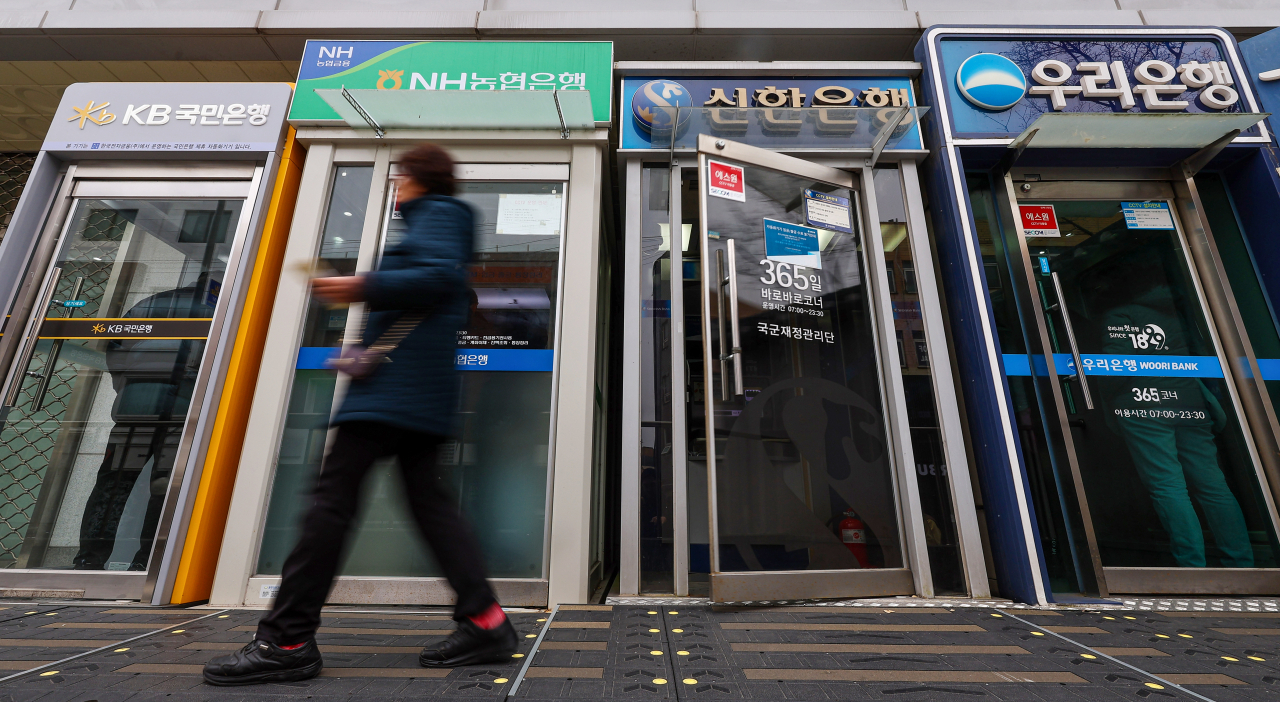 |
A citizen passes by a row of ATM machines in Seoul, Wednesday. (Yonhap). |
Korea is in the middle of blame-shifting, as banks face more than 3 trillion won ($2.28 billion) in losses combined in the first half of next year from the sales of equity-linked securities tied to a Hong Kong index.
Financial authorities are considering creating guidelines for compensation regarding the sales of ELS products tracking the Hang Seng China Enterprises Index, seeing the possibility of banks’ misselling. The value of ELS products sold by Korea’s five major banks set to mature next year surpasses 13 trillion won.
Though the guidelines have yet to be finalized, it is expected to be similar in form to that of the derivative-linked funds and securities misselling crisis in 2019, focusing on the principle of suitability.
The compensation rate for the derivative-linked funds was set at up to 80 percent. Banks had to compensate more when they suggested “unsuitable” products to investors and less for investors with extensive experience in financial investments.
Similar to the derivative-linked funds crisis, top financial watchdogs are lashing out against local banks, accusing them of irresponsible sales of the derivative product. The financial authorities have led an investigation on local banks and brokerages for misselling troubled products.
“It is suspicious whether the principle of suitability was adhered to, considering that the high-level, high-risk products were sold to older people at bank counters at a certain period,” Financial Supervisory Service Gov. Lee Bok-hyun said on Nov. 29.
“Banks commenting they have prevention measures against consumer damages after having largely sold (the ELS products) sounds like an evasion of responsibility,” Lee said.
Some also point out it is irregular for banks to massively sell high-risk products.
“In developed countries, most banks refrain from selling ELS products because if the sales go wrong and they are accused of misselling, they will be fined heavily, sometimes even leading to the shutdown of business,” said Lee Hyo-seob, senior research fellow at the Korea Capital Market Institute.
"Korea has seen large sales of derivative products in recent years, perhaps because the penalty of misselling is not as heavy as other countries," Lee said.
While the banks have halted the sales of the ELS products, they continue to remain cautious.
“As the losses have not yet been finalized, we are not discussing the banks' responsibility yet,” an official from a local bank said.
“Some think that the authorities have taken into consideration the fact that there are more customers who have resubscribed for the ELS products, and how the sales were made after the regulations were enhanced following the enactment and imposition of the Act on the Protection of Financial Consumers,” the official said.
The Consumer Protection Act mandates financial companies to comply with consumer protection measures including the “six conduct rules” of suitability, appropriateness, duty to explain, prohibition of unfair sales practice, prohibition of improper solicitation and advertisement regulations.
Market watchers say the compensation rate for ELS sales could be lower than that of the DLF crisis, as banks sold the product under tighter measures.
“As there have been compensation measures for cases of the financial industry’s misselling crisis, such as real estate fund and private equity fund crises, the ELS crisis is likely to follow the procedure,” said analyst Jun Seung-bae from eBest Investment & Securities.
“But considering a large percent of ELS investors are those who have resubscribed for the products, the compensation rate is likely to fall lower than that of the DLF crisis,” Jun said.
Furthermore, financial authorities could also be subject to responsibility for not having further regulated banks’ sales range, market experts viewed.
“The authorities are also to take the blame. Korea went through a very similar crisis in 2019 with the DLF incident. They could have come up with specific regulations controlling the banks’ responsibilities,” according to a market researcher who requested anonymity.







![[Today’s K-pop] Blackpink’s Jennie, Lisa invited to Coachella as solo acts](http://res.heraldm.com/phpwas/restmb_idxmake.php?idx=644&simg=/content/image/2024/11/21/20241121050099_0.jpg)